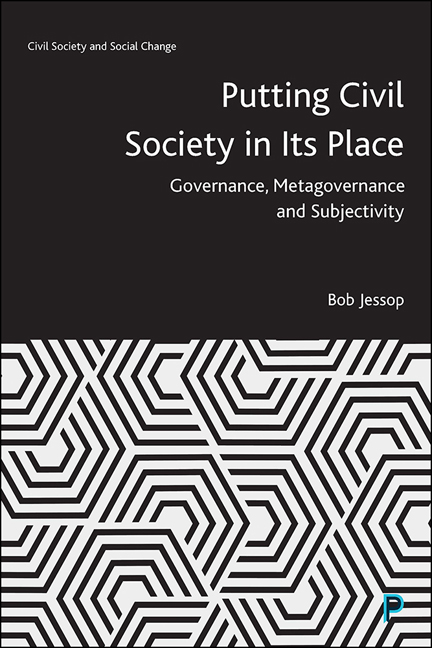Book contents
- Frontmatter
- Dedication
- Contents
- List of Tables and Figures
- Abbreviations
- Note on the Author
- Acknowledgements
- Licensing Information
- Preface
- 1 Introduction
- Part I Complexity, Contingency and Governance
- Part II Locating Civil Society as a Mode of Governance
- Part III Governance Failure and Metagovernance
- Endnotes
- References
- Index
Preface
Published online by Cambridge University Press: 18 March 2021
- Frontmatter
- Dedication
- Contents
- List of Tables and Figures
- Abbreviations
- Note on the Author
- Acknowledgements
- Licensing Information
- Preface
- 1 Introduction
- Part I Complexity, Contingency and Governance
- Part II Locating Civil Society as a Mode of Governance
- Part III Governance Failure and Metagovernance
- Endnotes
- References
- Index
Summary
As a more-or-less distinctive set of political practices, governance has a long history. Nonetheless, theoretical interest in these practices under the rubric of ‘governance’ has mostly emerged in the last 40 to 50 years. This was initially prompted in the late 1960s and 1970s by growing elite concerns in liberal democracies about governmental overload, state failure, legitimacy crises and general ungovernability – concerns that triggered a search for political and social arrangements to address these problems. One response was to seek to lower expectations by informing the public of the limits to what any government could achieve faced with growing global turbulence and scarce resources. Another was neoliberal calls for ‘more market, less state’. A third response, more significant for this book, was growing theoretical and practical interest in the potential of coordination through selforganizing networks, partnerships and other forms of reflexive collaboration and, relatedly, in an alleged ‘shift from government to governance’ in the polity and similar shifts from hierarchical authority to networked or ‘heterarchical’ coordination in many other social fields. This amounted to a rediscovery of the potential contribution of civil society to problem-solving without representing a direct engagement in philosophical reflection.
Relatedly, there has been growing interest from the late 1970s onwards in whether and how ‘civil society’ in one guise or another might enhance state capacity in the face of growing complexity and/or whether or how they might provide new ways to overcome old problems that postwar state intervention and the more recent (re)turn to market forces seem to have left unsolved, if not aggravated. Civil society is sometimes regarded as a flanking and supporting mechanism of neoliberalism and authoritarian statism. Involving civil society actors, organizations and partnerships raises hopes or expectations that policy-making and implementation will thereby be improved and made more accountable, either to relevant stakeholders and/or to pre-given criteria of efficiency, effectiveness, transparency and moral standards. This interest in civil society as a supplement to government occurs on all scales from the local state through metropolitan and regional governments to national states, and can also involve various intergovernmental arrangements at the international, transnational, supranational and global levels.
- Type
- Chapter
- Information
- Putting Civil Society in Its PlaceGovernance, Metagovernance and Subjectivity, pp. xiv - xxPublisher: Bristol University PressPrint publication year: 2020



